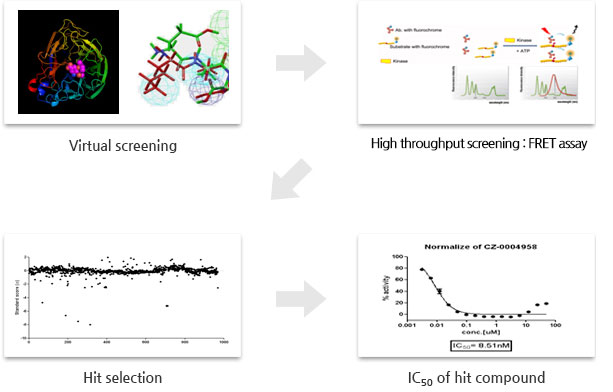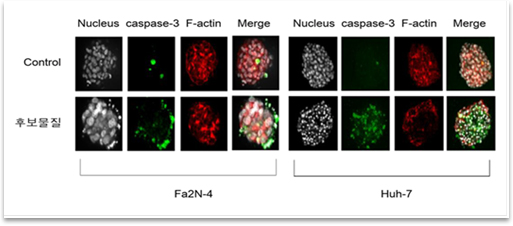|
High Throughput Screening(HTS) |
MEKi kinase assay |
| mTORi kinase assay | |
| Histone methyltransferase EHMT2/G9a assay | |
| Lantha EphB4 activity assay | |
| Deubiquitination activity assay | |
| GPCR Modulating activity screen (cell-based) | |
| Lethality of NCI-60 cancer cell panel | |
| Cancer cell lethality screen | |
| PDX-derived primary lethality screen | |
| Cancer stem cell lethality imaging in mix-culture system | |
| PD-1/PD-L1 Bl1ock assay | |
|
High Content Screening (HCS) |
Cell viability assay 3D culture system |
| Apoptosis assay | |
| Translocation activity of target molecules | |
| Detection of changing cell organelles | |
| Detection of DNA damage assay | |
| Cancer cell lethality imaging screen | |
| Primary lethality imaging screen | |
| Cancer stem cell lethality imaging in mix-culture system |
Service
- Phenotype/target-based screening setup
- Accelerated drug discovery through HTS campaigns
- Automated/optimized efficacy test for new anticancer agents
- in vitro efficacy evaluation of development compounds using the NCI-60 cancer cell panel
- Selection of hit compounds or target cancer types

Target enzyme / Phenotype-based screen

Automation and optimization of in vitro efficacy evaluation for anti-cancer drugs
Service example
- Screening of apoptosis inducing drugs based on high-throughput screening
|
Overview |
Analysis of caspase-3 activation images to evaluate the cancer cell apoptosis-inducing capability of the developing drug. |
|
Design |
- Automatic seeding of test cells - Drug treatment, washing, and cell fixing - Staining with cleaved caspase-3 antibody and image acquisition using HCS |
|
Result |
- Caspase-3 cleavage induced by anticancer candidate was detected and interpreted as apoptosis - Compared to the DMSO control, anticancer candidate demonstrated superior apoptosis-inducing ability, particularly in Huh7 drug  |





